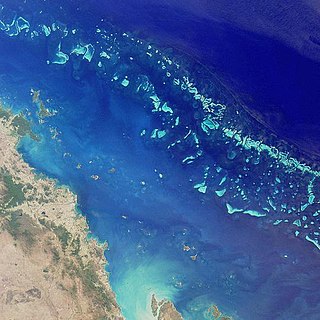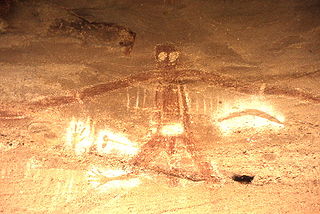
Norfolk Island is an external territory of Australia located in the Pacific Ocean between New Zealand and New Caledonia, 1,412 kilometres (877 mi) directly east of Australia's Evans Head and about 900 kilometres (560 mi) from Lord Howe Island. Together with the neighbouring Phillip Island and Nepean Island, the three islands collectively form the Territory of Norfolk Island. At the 2021 census, it had 2,188 inhabitants living on a total area of about 35 km2 (14 sq mi). Its capital is Kingston.

The governor of Queensland is the representative in the state of Queensland of the monarch, currently King Charles III. In an analogous way to the governor-general at the national level, the governor performs constitutional and ceremonial functions at the state level. In particular the governor has the power to appoint and dismiss the premier of Queensland and all other ministers in the Cabinet, and issue writs for the election of the state parliament.

The New South Wales Legislative Assembly is the lower of the two houses of the Parliament of New South Wales, an Australian state. The upper house is the New South Wales Legislative Council. Both the Assembly and Council sit at Parliament House in the state capital, Sydney. The Assembly is presided over by the Speaker of the Legislative Assembly.

Wyong Shire was a local government area located in the Central Coast region of New South Wales, Australia. The incorporation of the Wyong area dates back to 7 March 1906 when the entire area of the Brisbane Water Police District outside of the Town of Gosford was proclaimed as the Erina Shire. From 1 January 1947, local government in the Central Coast region was reorganised, creating Gosford Shire and Wyong Shire, which comprised Erina Shire north and east of Kulnura, Central Mangrove and Lisarow.
The New South Wales Government, also known as the NSW Government, is the governing body of New South Wales, Australia. The executive government comprises 11 portfolios, led by a ministerial department and supported by several agencies. There are also a number of independent agencies that fall under a portfolio but remain at arms-length for political reasons, such as the Independent Commission Against Corruption and Electoral Commission. The state Executive Council, consisting of the governor and senior ministers, exercises the executive authority through the relevant portfolio.
The New South Wales Department of Planning and Environment (DPE) was a department of the New South Wales Government, responsible for effective and sustainable planning to support the growth in the state of New South Wales, Australia. It made plans based on evidence for the state's cities and regions, working with the community, business and local government to create places for people in NSW to live, work and spend their leisure time, while ensuring good access to transport and other services like shops and restaurants. The department was also responsible for the evidence-based assessment of state significant development applications.

The Australian National Heritage List or National Heritage List (NHL) is a heritage register, a list of national heritage places deemed to be of outstanding heritage significance to Australia, established in 2003. The list includes natural and historic places, including those of cultural significance to Indigenous Australians such as Aboriginal Australian sacred sites. Having been assessed against a set list of criteria, once a place is put on the National Heritage List, the provisions of the Environment Protection and Biodiversity Conservation Act 1999 apply.

The Environment Protection and Biodiversity Conservation Act 1999(Cth) is an Act of the Parliament of Australia that provides a framework for protection of the Australian environment, including its biodiversity and its natural and culturally significant places. Enacted on 17 July 2000, it established a range of processes to help protect and promote the recovery of threatened species and ecological communities, and preserve significant places from decline. The Act is as of June 2020 administered by the Department of Agriculture, Water and the Environment. Lists of threatened species are drawn up under the Act, and these lists, the primary reference to threatened species in Australia, are available online through the Species Profile and Threats Database (SPRAT).

The National Parks and Wildlife Service (NPWS) is a directorate of the New South Wales Department of Planning and Environment and responsible for managing more than 890 national parks and reserves, covering over 7.5 million hectares of land across the state of New South Wales, Australia. Despite its name the NPWS is a state government agency rather than federal government, likewise as other states and territories National Parks agencies around Australia. However the states and territories agencies around Australia do still work closely together.

An Australian Aboriginal sacred site is a place deemed significant and meaningful by Aboriginal Australians based on their beliefs. It may include any feature in the landscape, and in coastal areas, these may lie underwater. The site's status is derived from an association with some aspect of social and cultural tradition, which is related to ancestral beings, collectively known as Dreamtime, who created both physical and social aspects of the world. The site may have its access restricted based on gender, clan or other Aboriginal grouping, or other factors.
Australian heritage laws exist at the national (Commonwealth) level, and at each of Australian Capital Territory, New South Wales, Northern Territory, Queensland, South Australia, Tasmania, Victoria, Western Australia state and territory levels. Generally there are separate laws governing Aboriginal cultural heritage and sacred sites, and historical heritage. State laws also allow heritage to be protected through local government regulations, such as planning schemes, as well.

The New South Wales State Heritage Register, also known as NSW State Heritage Register, is a heritage list of places in the state of New South Wales, Australia, that are protected by New South Wales legislation, generally covered by the Heritage Act 1977 and its 2010 amendments. The register is administered by the Heritage Council of NSW via Heritage NSW, a division of the Government of New South Wales Department of Planning and Environment.

Lesbian, gay, bisexual, and transgender (LGBT) people in the Australian state of New South Wales have most of the same rights and responsibilities as non-LGBT people.

Gabrielle Cecelia Upton, an Australian politician, is the member of the New South Wales Legislative Assembly, representing the seat of Vaucluse for the Liberal Party from 2011 until her retirement at the 2023 New South Wales state election.
The New South Wales Premier's Department, a department of the New South Wales Government, is responsible for leading the New South Wales public sector to deliver on the Government's commitments and priorities. The department provides administrative support that enables the cabinet to identify, design and implement a coordinated policy, project and reform agenda that boosts the efficiency, productivity and effectiveness across the State. The department consults and work closely with other New South Wales government departments, the Commonwealth Government, local government, business and the community to ensure responses to community needs are effective.

The Minister for Local Government, currently held since 5 April 2023 by Ron Hoenig, is a minister in the New South Wales Government and has responsibilities which includes all local government areas and related legislation in New South Wales, the most primary of which is the Local Government Act 1993. The minister administers the portfolio through the Planning and Environment cluster, in particular through the Office of Local Government, and a range of other government agencies. The minister assists the senior cluster minister, the Minister for Climate Change, the Environment, and Heritage. Both ministers are responsible to the Parliament of New South Wales.

The New South Wales Minister for Planning and Public Spaces is a minister in the Government of New South Wales with responsibility for regional and urban planning with the goal of facilitating sustainable growth and employment in New South Wales, Australia.

Canterbury-Bankstown Council, trading as the City of Canterbury Bankstown, is a local government area located in the South Western region of Sydney, New South Wales, Australia. The council was formed on 12 May 2016 from a merger of the City of Canterbury and the City of Bankstown, after a review of local government in New South Wales by the state government. The eastern portion of the council that was once City of Canterbury falls within the northern portion of The Parish of St George above Wolli Creek and The M5 but below the Cooks River.

James Henry Griffin is an Australian politician. He is a member of the New South Wales Legislative Assembly representing the electoral district of Manly for the Liberal Party. Griffin was the New South Wales Minister for Environment and Heritage in the Second Perrottet ministry from December 2021 to March 2023.

The Abernethy and Co Stonemason's Lathe is a heritage-listed former stonemason's lathe located at Moruya and District Historical Society, 85 Campbell Street, Moruya in the Eurobodalla Shire local government area of New South Wales, Australia. It was built during 1881 by J. Abernethy & Co, Aberdeen. The property is owned by the Office of Environment and Heritage, an agency of the Government of New South Wales. It was added to the New South Wales State Heritage Register on 2 April 1999.
















